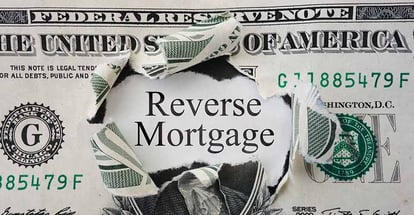Why a Reverse Mortgage is a Good Idea for Wealthy Retirees
Reverse mortgages are becoming an increasingly viable option for a wider range of seniors, dispelling the outdated notion that they are only for those who lack savings. With changes to the product and regulatory adjustments over time, reverse mortgages have become more attractive to a broader audience.
As a result, affluent seniors and financial planners alike are recognizing the benefits of this type of mortgage and are taking a closer look at its potential advantages.
Many wealthy retirees, professors, and financial planners use reverse mortgages as a powerful financial instrument not to survive in retirement, but optimize their portfolios and thrive.
A reverse mortgage can be a great way for retirees who are looking for additional sources of income during retirement and may need access to funds quickly without depleting their other investments or draining away any extra savings they had set aside as a safety net.
Keep reading to learn more about whether or not a reverse mortgage could be suitable for wealthy retirees.
The Reverse Mortgage Strategy for the Wealthy
Traditionally, a reverse mortgage has been seen as a last resort option for retirees who have exhausted all other sources of income. However, some financial planners are now advising a different strategy for those with other investments outside of their home equity.
Rather than waiting until all other options have been exhausted, these planners suggest taking out a reverse mortgage line of credit early to prevent tapping into other assets during market downturns.
For example, let's say you have an investment portfolio valued at $500,000, and the markets experience a significant drop of more than 5% due to economic fears or global energy concerns.
In such a scenario, retirees who rely on their investments must avoid selling their investments at a loss. This is where the reverse mortgage strategy can be particularly useful.
By taking out a reverse mortgage line of credit against your home, you can draw upon it at your leisure, without having to sell off your investments.
This strategy can help you avoid locking in losses during market downturns, thereby allowing you to hold onto your assets and wait for them to recover in value.
Furthermore, the earlier you take out the reverse mortgage credit line, the more money you can access. This is because the government-insured Home Equity Conversion Mortgage program allows the reverse mortgage line of credit to grow over time if left untouched.
Therefore, the longer you have the line of credit, the more you can access. This growth in the credit line can serve as a valuable source of income during retirement, especially when other investments may be experiencing volatility.
In summary, taking out a reverse mortgage line of credit early can serve as a smart strategy for retirees who have other investments outside of their home equity. By doing so, they can avoid tapping into their other assets during market downturns and potentially lock in losses.
The growth of the credit line over time can provide a valuable source of income during retirement, making the reverse mortgage strategy a useful tool in retirement financial planning.
What Experts Say
One of the key proponents of this approach is Harold Evensky, a financial planner and professor at Texas Tech University, who has authored several studies published in the Journal of Financial Planning on the topic.
His studies have shown that taking out a reverse mortgage line of credit earlier in retirement can help prevent retirees from having to sell off their investments in a down market, which could lock in losses and jeopardize their long-term financial stability.
Evensky's firm typically deals with clients who have a high net worth and do not default on their debts. However, they worry about the potential risks of having to sell off their investments during a market downturn.
As a result, they have been looking into ways to help their clients avoid this scenario, and reverse mortgages have emerged as a viable option.
Evensky himself admits that he used to have a negative attitude towards reverse mortgages, considering them to be too expensive and potentially predatory.
However, as the rules and costs have changed in recent years, he and his colleagues have revisited the strategy and found it to be a useful tool for their clients.
In a study published in May 2014, three researchers including Shaun Pfeiffer, Angus Schaal, and John Salter found that establishing a Home Equity Conversion Mortgage (HECM) line of credit early in retirement could provide higher 30-year survival rates than other last-resort strategies.
The survival advantage for real withdrawal rates at or above 5 percent was estimated to begin between 15 and 20 years after loan origination and was shown to be as high as 31 percentage points greater than the last resort survival rates.
The key to this strategy is to establish the reverse mortgage line of credit early in retirement, as the amount of credit available grows over time if left untouched.
This means that retirees can draw upon their home equity through the reverse mortgage line of credit without having to sell off their other investments, which can help to preserve their portfolio in a down market.
While this strategy may not be appropriate for everyone, it can be a useful tool for wealthy retirees who have substantial investments outside of their home equity.
By taking out a reverse mortgage line of credit early in retirement, they can help to protect their investments and ensure that they have enough cash flow to meet their expenses throughout their retirement years.
As more financial planners like Harold Evensky come around to this strategy, we may see more retirees using reverse mortgages as a proactive tool for their retirement planning.

The Key Advantages of a Reverse Mortgage
One of the key advantages of a reverse mortgage line of credit is that it grows over time. The longer the loan remains in place, the more money the borrower has access to.
This can be especially helpful for the wealthy who may be looking for a way to maintain their lifestyle without having to sell off their assets.
Another advantage of a reverse mortgage is that lenders cannot freeze the line of credit at any time. This is in contrast to a home equity line of credit, which lenders may choose to freeze during economic downturns.
Having access to a reverse mortgage line of credit can provide a sense of financial security and stability during times of economic uncertainty.
Additionally, many retirees may not have the income needed to qualify for a traditional home equity line of credit. Reverse mortgages do not consider income or assets when qualifying borrowers, making them accessible to those who may not meet the criteria for other types of loans.
However, it's important to note that reverse mortgages should not be used as leverage or an investment vehicle.
As financial advisor Harold Evensky points out, reverse mortgages should be seen strictly as a risk management tool. They can be used to help investors maintain a long-term portfolio without having to sell at inopportune times.
Strategic Tax Planning
Reverse mortgages can provide a number of tax benefits for retirees. The Tax Cuts and Job Act of 2017 changed the tax laws, increasing the standard deduction and making only acquisition indebtedness deductible on mortgage interest.
This makes the reverse mortgage a more valuable tool for strategic IRA withdrawals, Roth conversions, Net Unrealized Appreciation (NUA), and other strategies focused on deferred or accelerated tax accounts.
Home Equity Conversion Mortgage Line of Credit (HECM LOC) can be used to maximize the tax benefits of a reverse mortgage. It continues to grow and allows borrowers to withdraw tax-free funds in the future.
For example, a client who buys a $600,000 home and takes out a $300,000 reverse mortgage can let the interest accrue for several years.
As the balance becomes negative, the borrower can take a voluntary distribution from their IRA and make a voluntary interest payment to the HECM LOC, which reduces the balance owed and triggers a 1098 tax form.
This is deductible as mortgage interest (or MIP) on Schedule A and may exceed the $24,000 standard deduction. This payment also increases the available credit in a tax-free distribution that can be used immediately or kept in the line of credit, earning interest.
Retirees can repeat this process several times whenever the interest balance substantially exceeds the standard deduction.
The Earlier the Better
One of the most attractive features of this type of mortgage is that the line of credit grows over time. This means that the longer the line of credit goes untouched, the more growth potential you have.
Homeowners who plan to use a reverse mortgage line of credit to supplement their retirement income should consider starting the process early and leaving the funds untouched as long as possible to maximize the growth potential.
While it may be tempting to withdraw from the reverse mortgage line of credit as soon as it's available, doing so will limit the amount of growth potential in the future. Instead, it's important to be strategic about when and how to use the funds.
For example, if you don't need the funds immediately, it may be wise to wait and let the line of credit grow for a few years before accessing it. By doing so, you'll benefit from compounding interest, which means that your line of credit will grow faster and faster over time.
Another benefit of a reverse mortgage line of credit is that it can be used as a safety net for unexpected expenses. By having a line of credit available, you can avoid tapping into other retirement accounts or investments, which can save you money in taxes and penalties.
Plus, you'll have peace of mind knowing that you have a source of funds to cover unexpected expenses, such as healthcare or home repairs.
By starting the process early and being strategic about when to access the funds, homeowners can maximize the growth potential of their line of credit and enjoy the benefits of compounding interest over time.
Jumbo vs HECM Reverse Mortgages
Jumbo reverse mortgages and HECM (Home Equity Conversion Mortgages) are two types of reverse mortgages available for seniors. Both of these options provide seniors with the ability to tap into their home equity without making mortgage payments.
Jumbo reverse mortgages are designed for homeowners who have high-value homes with significant amounts of home equity.
Jumbo reverse mortgages can provide more substantial amounts of cash than HECM because of the higher home values.
However, jumbo reverse mortgages have higher interest rates and fees than HECM loans, making them more expensive.
Benefits of Jumbo Reverse Mortgages:
-
Access to higher amounts of cash - Jumbo reverse mortgages can provide more significant amounts of cash to homeowners with high-value homes.
-
No mortgage insurance - Unlike HECM loans, jumbo reverse mortgages do not require mortgage insurance premiums.
- Flexibility - Jumbo reverse mortgages can be used to pay off existing mortgages, make home improvements, and cover any other expenses.
Benefits of HECM:
-
Government-insured - HECM loans are insured by the Federal Housing Administration (FHA), which provides protection for borrowers.
-
Lower costs - HECM loans have lower interest rates and fees than jumbo reverse mortgages, making them a more affordable option for homeowners.
- Non-recourse loan - HECM loans are non-recourse loans, which means that the borrower or their heirs will never owe more than the home is worth, even if the loan balance exceeds the home value.
Overall, both jumbo reverse mortgages and HECM loans provide seniors with access to their home equity without making mortgage payments.
However, jumbo reverse mortgages may be more suitable for homeowners with high-value homes, while HECM loans are a more affordable and government-insured option.
It's essential to carefully consider the benefits and costs of each type of reverse mortgage and consult with a financial advisor before making a decision.
Bottom Line
Reverse mortgages are no longer just a last-resort option for seniors who lack savings. They can be a valuable financial tool for wealthy retirees who are looking for additional sources of income during retirement and want to optimize their portfolios.
Taking out a reverse mortgage line of credit early in retirement can help prevent retirees from having to sell off their investments during market downturns, which can preserve their assets and potentially increase their long-term financial stability.
All in all, wealthy retirees should give serious consideration to whether a reverse mortgage is the right move for their circumstances.
The complexity of the loan and the risks that accompany it require detailed research and financial expertise to ensure you understand the potential impacts it may have on your financial situation.
To make sure you are making an educated decision about a reverse mortgage for retirement, reach out to MakeFloridaYourHome.
Our team of professionals can review your financial situation with care and consideration, so you can make an informed decision that best meets your retirement needs.
on with care and consideration, so you can make an informed decision that best meets your retirement needs.
With over 50 years of mortgage industry experience, we are here to help you achieve the American dream of owning a home. We strive to provide the best education before, during, and after you buy a home. Our advice is based on experience with Phil Ganz and Team closing over One billion dollars and helping countless families.

About Author - Phil Ganz
Phil Ganz has over 20+ years of experience in the residential financing space. With over a billion dollars of funded loans, Phil helps homebuyers configure the perfect mortgage plan. Whether it's your first home, a complex multiple-property purchase, or anything in between, Phil has the experience to help you achieve your goals.


 By
By  Edited by
Edited by 






